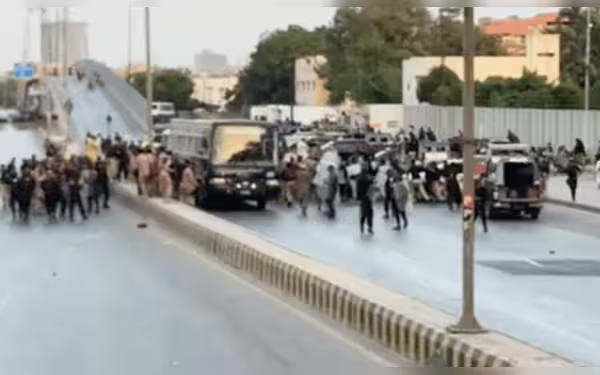Friday, October 4, 2024 01:33 AM
Protests Erupt in Karachi Over Nasrallah's Killing
- Clashes between police and protesters in Karachi.
- Thousands protest against Israel's actions nationwide.
- MWM condemns police response as 'shameful'.
 Image Credits: dawn
Image Credits: dawnNationwide protests erupt in Pakistan following the killing of Hezbollah chief Hassan Nasrallah, leading to clashes in Karachi and Islamabad.
In recent days, Pakistan has witnessed a surge in protests following the tragic killing of Hezbollah chief Hassan Nasrallah by an Israeli airstrike in Lebanon. This incident has ignited widespread outrage across the nation, prompting thousands to take to the streets in various cities, including Karachi and Islamabad, to express their condemnation of Israel's actions and to mourn the loss of a significant figure in the resistance against Israeli aggression.
On Sunday evening, Karachi became the epicenter of these protests, where demonstrators clashed with police. The rally, organized by the religio-political party Majlis Wahdat Muslimeen (MWM), began at the PIDC intersection and was intended to culminate at the US Consulate. However, tensions escalated when police set up barriers to prevent protesters from advancing. As demonstrators attempted to breach these obstacles, clashes erupted, leading to the use of tear gas by law enforcement and stone-throwing by protesters.
Footage circulating on social media depicted chaotic scenes, with clouds of tear gas filling the air and protesters waving Hezbollah flags while chanting slogans against Israel and the United States. The police reported injuries among their ranks, including a station house officer, due to the stone-pelting by some protesters. In a concerning turn of events, journalists covering the protests also faced violence, with reports of injuries and damage to news vehicles.
Deputy Inspector General (DIG) South Asad Raza stated that an understanding had been reached with the protesters for a peaceful demonstration, but this was reportedly violated, leading to the clashes. He emphasized that police action was taken in response to the violence, including aerial firing by some demonstrators. Although some arrests were made, those detained were later released after negotiations with protest organizers.
The Sindh Home Minister, Ziaul Hassan Lanjar, expressed concern over the incident, calling for increased police presence to maintain order and protect civilians, including journalists. Meanwhile, MWM condemned the police response, labeling it as "shameful" and asserting that the rally was a legitimate expression of grief and protest against foreign interference.
Protests were not limited to Karachi; similar demonstrations occurred in Islamabad, where around 4,000 people gathered to voice their dissent. Former senator Mushtaq Ahmed and several others were arrested during a protest outside the Islamabad Press Club, further highlighting the tense atmosphere surrounding these events.
As the situation unfolds, it is clear that the killing of Hassan Nasrallah has resonated deeply within Pakistan, igniting a wave of protests that reflect broader sentiments regarding foreign intervention and the plight of Palestinians. The events in Karachi and Islamabad serve as a reminder of the complex geopolitical landscape in which these protests are situated, as well as the passionate responses they elicit from various segments of society.
The protests following Nasrallah's killing underscore the deep-rooted emotions surrounding issues of sovereignty, resistance, and solidarity with oppressed communities. As citizens continue to express their views, it is essential for authorities to engage in dialogue and seek peaceful resolutions to prevent further escalation of tensions. The situation remains fluid, and the coming days will be crucial in determining how these protests will shape the political discourse in Pakistan.













